|
|
|
Sort Order |
|
|
|
Items / Page
|
|
|
|
|
|
|
| Srl | Item |
| 1 |
ID:
167688


|
|
|
|
|
| Summary/Abstract |
This paper challenges dominant understandings of ‘rising powers’ by developing a decentred, relational account of Russia and China in Central Asia. We ask whether Moscow and Beijing’s regional integrative strategies do not guide, but rather are led by, everyday interactions among Russian and Chinese actors, and local actors in Central Asia. Rising powers, as a derivative of ‘Great Powers’, are frequently portrayed as structurally comparable units that concentrate power in their executives, fetishise territorial sovereignty, recruit client states, contest regional hegemony and explicitly oppose the post-1945 international order. In contrast, we demonstrate that the centred discourse of Eurasian integration promoted by Russian and Chinese leaders is decentred by networks of business and political elites, especially with regard to capital accumulation. Adopting Homi K. Bhabha’s notion of mimicry (subversion, hybridity) and J. C. Scott’s conception of mētis (local knowledge, agency), and using examples of Russian and Chinese investments and infrastructure projects in Central Asia, we argue that in order to understand centring discourse we must look to decentring practices at the periphery; that is, rising power is produced through ongoing interactions between actors at the margins of the state’s hegemonic reach.
|
|
|
|
|
|
|
|
|
|
|
|
|
|
|
|
| 2 |
ID:
166783
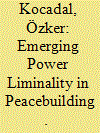

|
|
|
|
|
| Summary/Abstract |
International peacebuilding is no longer dominated by Western actors and their liberal peace framework, neither there is a full-fledged alternative formulated by emerging peacebuilding actors. In this paper, I first establish the relationship between the liminality of emerging powers and their mimicry of the liberal peace. Secondly, I distinguish three forms of mimicry in peacebuilding that stem from emerging power liminality: a discursive mimicry, a complete mimicry and a substantive mimicry. In the case of the discursive mimicry, there is a liberal peacebuilding discourse which is rarely substantiated with policies. The complete mimicry is when both the liberal discourse and the policies are mimicked, and the substantive mimicry is a genuine adaptation of the liberal peacebuilding by the emerging power. The case of Turkish peacebuilding is analysed to illustrate the tripartite distinction. I demonstrate that Turkey mimics solely the discourse of the democratic peace thesis, while there is a complete mimicry of the Western model in security sector reform. However, the Turkish civil society peacebuilding and Turkey’s approach to economic development substantively mimic their liberal peace counterparts. This article contributes to the critical literature on liberal peacebuilding by identifying the different forms of emerging actors’ mimicry of the liberal peace.
|
|
|
|
|
|
|
|
|
|
|
|
|
|
|
|
| 3 |
ID:
131888
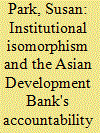

|
|
|
|
|
| Publication |
2014.
|
| Summary/Abstract |
In the 1990s Multilateral Development Banks created accountability mechanisms (AMs) that allowed people affected by development projects redress. Currently undertheorized, this paper examines how and why the Asian Development Bank (ADB) created an AM, and whether the AM serves its purpose to hold the ADB to account and to provide 'fair hearing of the views of the affected group'. This article argues that the ADB created a new AM because of institutional isomorphism, borrowing the idea of the AM from the World Bank as a result of coercive and mimetic isomorphic processes. Further, that the ADB introduced a mechanism ill-suited to the pre-existing (old) organizational culture of the ADB, which is based on consensus and hierarchical rule-following in the context of ADB operations to further economic growth while upholding state sovereignty. Despite its restructure and recent review, the mechanism's weakness was revealed through a stand-off between China and the AM over an investigation begun in 2009 (creating something 'blue'). The paper concludes that the AM's ability to serve its purpose will remain hampered as long as ADB maintains consensus around economic growth and state sovereignty over providing recourse to affected people.
|
|
|
|
|
|
|
|
|
|
|
|
|
|
|
|
| 4 |
ID:
126173
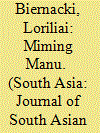

|
|
|
|
|
| Publication |
2013.
|
| Summary/Abstract |
This paper proposes an example of mimicry as an instance of intertextuality across genres, revealing a complex social response to normative, orthodox attitudes towards women through a close analysis of two very different types of male-authored religious texts from India, Tantric texts and a particularly famous law book, Manava Dharma Sastra. I argue that mimicry functions to undermine a normative stance towards women by appropriating and subverting the well-known verse from Manu's Law Book that states that women should not be permitted any independence from their male guardians. In this case, this verse is reformulated to reverse the meaning it originally had in Manu's Dharma Sastra, communicating a very different attitude towards women. This Tantric subversion of Manu suggests not only that elements of legal texts impacted on non-dominant populations through imitation and circulation in circles outside of expected Brahmanical orthodoxy, but also that textual satire via appropriation of these verses may have at times offered resistance, contesting the political assertions of a normative view.
|
|
|
|
|
|
|
|
|
|
|
|
|
|
|
|
| 5 |
ID:
167049
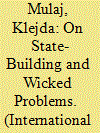

|
|
|
|
|
| Summary/Abstract |
Responding to a set of wicked problems pertaining to weak or failed states, state-building remains circumscribed by many of the problems it strives to address. Despite the expansion of literature, the challenging task of (re)building states in a postconflict setting is characterized by inadequate intellectual and policy coherence. Engaging with the existing literature, this article seeks to add clarity in ways that relate directly to the agendas of academic research and policy making. Casting into sharper relief what is distinctive and/or familiar in state formation processes in the West and the rest of the world, the analysis highlights the differing impact of nationalism. In considering the critique that contemporary international-led state-building neglects nation-building, the article suggests that the stateness of polities undergoing state-building is intrinsically linked with nationhood. State-building resides in both international and national locations of politics which condition the constitution of national identity via multiple (unequal) exchanges between external and local actors that can be depicted in terms of mimicry. Multiple political locations of state-building notwithstanding, the task of bringing the imagined community into being is more suited to national actors. Ongoing challenges of nation- and state-building require more acknowledgement that the realization of the nation cannot be a primary domain of international actors.
|
|
|
|
|
|
|
|
|
|
|
|
|
|
|
|
| 6 |
ID:
179326
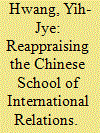

|
|
|
|
|
| Summary/Abstract |
This article aims to revisit the enterprise of the Chinese School (CS) of IR and discuss how it should be viewed and handled in the discipline, specifically from within the analytical framework of the power/resistance nexus put forward by Foucault, Bhabha, and Spivak. The argument of this article is twofold. Firstly, the CS attempts to reinvigorate traditional Chinese concepts (that is, humane authority, the Tianxia system, and relationality), which mimick Western mainstream IR. These concepts channel the CS into a realist notion of power, a liberal logic of cosmopolitanism, and a constructivist idea of relationality. Thus, the CS uses against the West concepts and themes that the West currently use against the non-Western world. Nevertheless, as the second part of the argument will demonstrate, the enterprise of the CS can still be justified because it can be regarded as a reverse discourse; mimicking yet altering the original meanings of the taken-for-granted concepts, ideas, and principles used by mainstream IR scholars. Moreover, with the judicious use of strategic essentialism, the CS can potentially be one local group in a wider effort to contest diffused and decentred forms of Western domination through linking various struggles to form a unified ‘counter-hegemonic bloc’ of post-Western IR in the discipline.
|
|
|
|
|
|
|
|
|
|
|
|
|
|
|
|
|
|
|
|
|